|
![[4th World Water Forum]](/crs/worldwater4/pix/w4wflogo.jpg)

|
4th World Water Forum
Mexico City | March 16-22, 2006
4th World Water Forum Discusses Water for Food and Environment
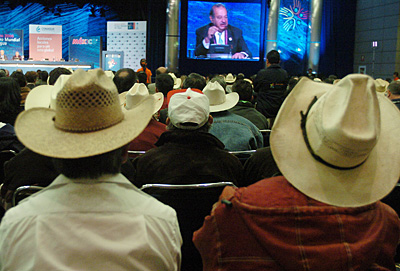
On Monday, 4th World Water Forum participants addressed the theme of
"Water for Food and the Environment," convening in plenary and
thematic sessions held throughout the day. They also heard a keynote
presentation by Carlos Slim Helú, Chairman of Grupo Carso, and a
regional presentation focused on the Middle East, North Africa and
Central Asia, a region experiencing the greatest water scarcity on the
planet.
Above: Mexican campesinos and other participants attend a keynote by
Carlos Slim Helú, Chairman of Grupo Carso, on Mexico's water
situation and financial solutions.
|
|
Monday, 20 March
|
|
Regional Presentation
|
|

|
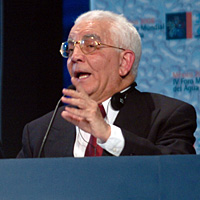
Chair Safwat Abdel-Dayem, Arab Water Council (AWC), introduced the session
on experiences from the Middle East, North Africa and Central Asia.
|
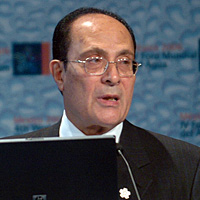
Mahmoud Abu-Zied, AWC President and Egypt's Minister of Water
Resources and Irrigation, described the region's broad consultative
process in preparation for the 4th Forum, highlighting the involvement
of scientists and civil society.
|
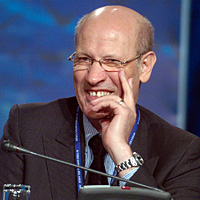
El Mahdi Ben Zekry, Morocco's Deputy Secretary of State for Water,
introduced the region as being characterized by precarious water
resources, low average rainfall and excessive evaporation, and
distinguished by a history of great ancient civilizations developed
around the exploitation of water resources.
|
|
Keynote Address
|
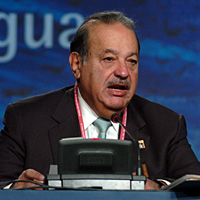
|
Carlos Slim Helú, Chairman of Grupo Carso, provided a historical
overview of water distribution, the climatic changes affecting it, and
humankind's relationship with water. He stressed that in today's
services-based economy, there is an urgent need for investments in the
water sector and cultural change.
Slim Helú highlighted Mexico's water situation, noting aquifer
overexploitation, leading to eventual contamination. He stressed
that the water problem is fundamentally an investment problem and to
address it, proposed the creation of an autonomous water agency outside
the national budget, in the form of a public-private partnership, which
would enable it to perform according to the best world standards.
|
|
Financing Water for Agriculture
|

|

Session Chair Alan Hall, Global Water Partnership (GWP), said financing
water for agriculture should focus on meeting the Millennium Development
Goal (MDG) targets on hunger and poverty while addressing macro-economic
factors such as population growth, urbanization, changing lifestyles,
and trade globalization.
|

Jim Winpenny, GWP consultant, introduced a progress report prepared by a
working group comprised of representatives of, among others, the GWP,
WWC, FAO, World Bank and others. He said future needs include
modernizing and rehabilitating existing irrigation systems and upgrading
rain-fed and groundwater systems, which will require major institutional
reforms
|

Humberto Peña, Chilean Water Directorate, described two new
financing mechanisms for agriculture irrigation used in Chile: one
mechanism for small water works, for a maximum cost of projects of US$
265,000, and another one for large water works, as a concession for
public infrastructure. He emphasized open, competitive and transparent
procedures and risk sharing by private and public funds.
|
|
Water Challenges and Perspectives in Megacities
|

|

Paul Shoenberger, West Basin Municipal Water District, described water
management practices in his municipality in southern California, US,
noting a focus on using local water sources and recycled water. He
reviewed funding sources and the different uses of recycled water.
|

Jorge Malagón Diaz, Valley of Mexico Water, outlined water and
sanitation challenges in the Valley of Mexico, which holds 20 percent of
the population and approximately one third of the country's Gross
Domestic Product. He said sustainable management of the Valley's
water requires urgent investments in the promotion of rainwater
harvesting, infrastructure development and maintenance, and ecosystem
rehabilitation.
|

Duan Wei, Beijing Water Authority, discussed the challenges and
strategies used for water resources management in Beijing, China. He
described water sources and conditions in the Beijing area, wastewater
treatment and water works, water-related legislation and financing. He
highlighted as challenges: decreasing supplies of surface and
groundwater, increasing water demand, water works upgrading, and
pollution.
|
|
Improving Agricultural Water Productivity in Dry Areas
|

|

Session Co-Chair Adel El-Beltagy, Director General, ICARDA, opened the
session by noting that more than a billion people live in dry areas,
more than half of whom depend on agriculture for their livelihoods.
|

Session Co-Chair Margaret Catley-Carlson, GWP, stressed that science and
technology solutions can help to overcome water shortage challenges, but
that these can only be successful within an appropriate policy
framework.
|

Pasquale Steduto, FAO, examined water productivity at the farm level. He
highlighted the need to consider both the biophysical and socioeconomic
components of water productivity, noting that the term has multiple
definitions.
|
|
Governance as a Key Factor for IWRM in Megacities
|

Participants at the session on governance heard presentations on
regional collaboration, activities of public agencies, and
characteristic features of regional governance programs.
|
|
Water Education for Children and Youth
|

|

Chair Dennis Nelson, Project WET International Foundation, stressed the
need for every person in the water sector to be involved in water
education.
|

Rita Vázquez del Mercado Arribas, Mexican Institute of Water Technology
(IMTA), described Mexican activities in the framework of the
international project "Discover a Watershed," noting that they
aim to reach a wide range of stakeholders, and particularly indigenous
communities.
|

Maria Angelica Alegria, Chilean Water Directorate, highlighted youth
education components of Chile's National Water Policy and stressed
the importance of alliances for effective programmes.
|
|
Virtual Water in the Arab Region
|

Participants in the session on virtual water discussed water used to
produce crop commodities, which is traded when countries import crop
commodities, and heard presentations on food production and transport.
|
|
Struggle for a New Water Culture in Latin America and Europe
|

|

Session Chair José Esteban Castro, University of Newcastle upon Tyne,
introduced the concept of new water culture that calls for
"eco-friendly" and sustainable management of water.
|

Patrick McCully, Executive Director of the International Rivers Network,
noted the importance of a new water culture in helping communities to
fight against the renewed trend towards water mega-projects.
|

Martha Delgado Peralta, Mexican Alliance for a New Water Culture,
described the outcomes of the first Latin American meeting for a new
water culture in 2005, lauding its broad participation and
interdisciplinary debate.
|
|
Payment for Environmental Services
|

|

Stefano Pagiola, World Bank, explained the concept of payment for
environmental services, saying it is based on two principles: users must
pay for the environmental services they enjoy, and suppliers must be
compensated for delivering them.
|

Carlos Rodriguez, Costa Rican Minister of Environment, Energy and
Mining, warned that unsustainable production and consumption patterns
are leading societies toward collapse as natural resources are consumed
faster than nature can replenish them.
|

Juan Carlos Hernández Ramírez, Sierra Gorda Ecological
Group, presented on local experiences in Queretaro, Mexico, in the
conservation of hydrological and biological resources and the capture of
carbon that provided economic, social and environmental benefits to
local communities.
|
|
Capacity Development Strategies and Social Learning
|

|

Jan Luijendijk, UNESCO-IHE, noted that while investments in water
infrastructure over the past 30 years have totaled US$ 600 billion,
about half of all investments in developing countries have been
unsuccessful due to lack of capacity.
|

Sylvanie Jardinet, Action Against Hunger, presented lessons learned from
a project on capacity development for food security in Nicaragua,
including: the need to focus not only on technical know-how, but also on
social and economic aspects, better research, and ensuring knowledge
transfer.
|

Carlos Garcés-Restrepo, FAO, noted that capacity-building projects are
increasingly recognized as full projects in their own right, not just as
a component of project funding proposals.
|
|
Around the Forum
|

Children played a floor-sized version of the Ramsar Secretariat's
water cycle board game, with t-shirts and other prizes going to the
winners.
|
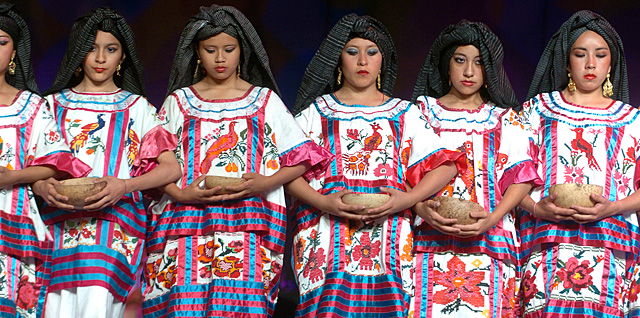
In the evening, participants were entertained by dancers from the state
of Oaxaca.
|
|
More Information
4th World Water Forum Site
Conference Program
World Water Council
|
Related Links
3rd World Water
Forum,
Kyoto, Shiga and Osaka, Japan, March 2003
Ramsar Convention on Wetlands
Ramsar COP-9,
Kampala, Uganda, November 2005
3rd Global
Conference on Oceans, Coasts and Islands,
Paris, France, January 2006
|

|
|